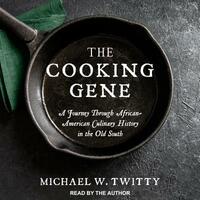Take a photo of a barcode or cover
537 reviews for:
The Cooking Gene: A Journey Through African-American Culinary History in the Old South
Michael W. Twitty
537 reviews for:
The Cooking Gene: A Journey Through African-American Culinary History in the Old South
Michael W. Twitty
challenging
dark
emotional
hopeful
informative
reflective
medium-paced
This book was fascinating, and I learned so much. The writing is almost lyrical and makes you hungry on every page, but also introspective. There's much to unpack here, but it was a new and satisfying reading experience.
I thought this book was an incredibly important and valuable insight into contributions slaves made to culinary history and the overall American identity. There is so much examined, discussed, and experience that I had never previously considered and should be a regular part of every curriculum.
informative
reflective
slow-paced
4.75⭐️
I think this was such a fascinating and well researched history of the author’s family and that the overall connection it and many other’s have to slavery and southern cooking. I really appreciated the deep dive and explanations of the similarities between southern cooking and west African cooking. The step by step process of how he figured out his family history was so interesting to follow and I appreciated that he shared it in this format of story telling. Additionally, I liked the constant discussions on how people always want to cook as well as their grandparents and explaining the origins of many of the traditions they knew but didn’t always have a reason for doing. Overall, I enjoyed my time listening to this history and think many people can get a wide variety of things from this. Definitely opened up my mind and I learned a lot.
I think this was such a fascinating and well researched history of the author’s family and that the overall connection it and many other’s have to slavery and southern cooking. I really appreciated the deep dive and explanations of the similarities between southern cooking and west African cooking. The step by step process of how he figured out his family history was so interesting to follow and I appreciated that he shared it in this format of story telling. Additionally, I liked the constant discussions on how people always want to cook as well as their grandparents and explaining the origins of many of the traditions they knew but didn’t always have a reason for doing. Overall, I enjoyed my time listening to this history and think many people can get a wide variety of things from this. Definitely opened up my mind and I learned a lot.
informative
reflective
medium-paced
challenging
dark
emotional
informative
inspiring
reflective
sad
slow-paced
informative
reflective
slow-paced
challenging
emotional
informative
reflective
sad
medium-paced
Michael W. Twitty does just what his title mentions; he takes the reader on a journey. Twitty intertwines his genealogical heritage that has been meticulously researched and backed by DNA analysis with the culinary history of the South and follows this history back to Africa. As Twitty unfolds his ancestry, he looks at the staple crops grown on Southern plantations, where those before him worked as enslaved people. He discusses the history of the foods and culinary traditions the enslaved held fast to as they were forced to make a new home in the American South. As he explores these topics, he connects the paths of his ancestors from Africa to the South and imagines how they lived and endured.
Twitty spent years researching his ancestry, visiting plantations and areas along the South where his ancestors lived. Eventually, he would visit England to explore his European heritage and finally to Africa, where he was invited to feast on the foods and dishes that are the foundations of Southern American cuisine. Twitty also briefly looks at the Jewish roots of his family as a comparative analysis of culinary history.
Michael W. Twitty is a chef and culinary historian exploring his heritage to the very foods he grew up on. These foods are the inspiration and basis of his unique style of cooking. I'm looking forward to reading his latest book, which explores in-depth his Jewish roots and their influence on his culinary journey.
Twitty spent years researching his ancestry, visiting plantations and areas along the South where his ancestors lived. Eventually, he would visit England to explore his European heritage and finally to Africa, where he was invited to feast on the foods and dishes that are the foundations of Southern American cuisine. Twitty also briefly looks at the Jewish roots of his family as a comparative analysis of culinary history.
Michael W. Twitty is a chef and culinary historian exploring his heritage to the very foods he grew up on. These foods are the inspiration and basis of his unique style of cooking. I'm looking forward to reading his latest book, which explores in-depth his Jewish roots and their influence on his culinary journey.




